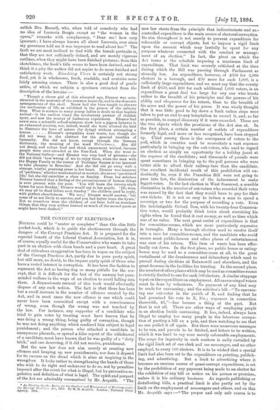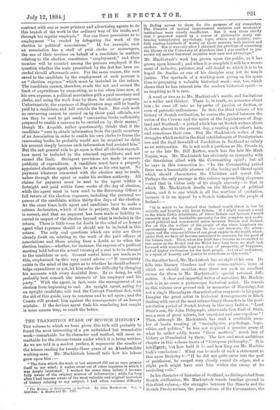THE CONDUCT OF ELECTIONS.* NOTHING could be "neater or completer"
than this slim little pocket-book, which is to guide the electioneerer through the dangers of the Corrupt Practices Act. It is prepared for the especial benefit of the Liberal Central Association, but it is, of course, equally useful for the Conservative who wants to take part in an election with clean hands and a pure heart. A great deal of ridiculous exaggeration has been in vogue on the subject of the Corrupt Practices Act, partly due to pure party spirit, but still more, no doubt, to the impure party spirit of those who have a vested interest in corruption. It has been the fashion to represent the Act as having dug so many pitfalls for the cor- rupt, that it is difficult for the feet of the unwary but pure- minded walkers in the ways of an election to avoid falling into them. A dispassionate perusal of this book would effectually dispose of any such notion. The fact is that there has been but a small increase in the number of offences created by the Act, and in most cases the new offence is one which could never have been committed except with a consciousness of wrong, even though the wrong was not touched by -the law. For instance, any supporter of a candidate who tried to gain votes by treating must have known that he was doing a wrong thing, being guilty of corruption, though he was not doing anything which rendered him subject to legal punishment ; and the person who attacked a candidate in anonymous placards, or spread a false report of the withdrawal of a candidate, must have known that he was guilty of a "dirty trick," and one deserving, if it did not receive, punishment.
But the new law does not aim merely at creating new offences and heaping up new punishments, nor does it depend for its success on the dread which it aims at inspiring in the wrongdoer. It looks rather to strengthening the hands of those who wish to do right and endeavour to do so, not by penalties imposed after the event for what is illegal, but by preventive re- gulation and definition of what is legal. The spirit and purport of the Act are admirably summarised by Mr. Asquith. " The
• An Election Guide : Rules for the Conduct and Management of Elections under the Corrupt Practices Act, 1883. By H. H. Asquith. London National Press Agency. 1884.
new law starts from the principle that indiscriminate and un- controlled expenditure is the main source of electoral corruption Its aim throughout is not merely to prevent expenditure for colourable or corrupt objects, but to impose a rigid limit upon the amount which may lawfully be spent for any purpose whatever connected with the conduct or manage- ment of an election." In fact, the pivot on which the Act turns is the schedule imposing a maximum limit of expenditure. That limit was severely criticised at the time during which the Bill was passing through -Parliament as absurdly low. An expenditure, however, of £350 for 2,060 electors in a borough, and £30 more for each 1,000, is a sufficiently large expenditure, and we must say that the county limit of £650, and for each additional 1,000 voters, is an expenditure a great deal too large for any one who trusts rather to the breadth of his principles and the powers of his ability and eloquence for his return, than to the breadth of his acres and the power of his purse. It was wisely thought that it was little good to lay down a limit unless steps were taken to put an end to any temptation to exceed it, and, as far as possible, to compel discovery if it were exceeded. These are the two objects which the provisions of the Act aim at. In the first place, a certain number of outlets of expenditure formerly legal, and more or less recognised, have been stopped up. Chief among these is the conveyance of voters to the poll, which in counties used to necessitate a vast expense' particularly in bringing up the out-voters, who used to regard an election as simply an opportunity for a holiday jaunt at the expense of the candidate ; and thousands of pounds were spent sometimes in bringing up to the poll persons who were better able to afford their railway-fare than the candidate. One excellent incidental result of this prohibition will un- doubtedly be, even if the Franchise Bill were not going to pass into law, the diminution of the inducement to make faggot-votes. In the last election in West Somerset, a sensible diminution in the number of out-voters who recorded their votes was caused by the fact that they would have to pay for their own tickets. It is not so easy to induce a man to spend a sovereign or two for the purpose of recording a vote. Even the indefatigable Oxford Don, with his twenty-four Conserva- tive votes, would probably think twice about exercising his rights when he found that it cost money, as well as time which was of no value. The next great outlet of expenditure is that for committee-rooms, which are more particularly expensive in boroughs. Many a borough election used to resolve itself into a race for committee-rooms, and the candidate who could secure most public-houses and other places of entertainment was sure of his return. This item of waste has been effec- tually cut down. In the first place, no public house or eating- house may be used as a committee-room at all, to the great curtailment of the drunkenness and debauchery which used to prevail during elections at Eatanswill and elsewhere, and the great decrease in the facilities for treating. In the second place, the number of other places which may be used as committee-rooms is strictly limited to one for each 500 electors. A similar stoppage is put on the expenditure on employment. All canvassing of voters must be done by volunteers. No payment of any kind may be made for canvassing ; and the solicitor's bill—" To canvass- ing one out-voter in the parish of B, and finding that he had promised his vote to X, 10s.; expenses in connection therewith, £1,"—has become a thing of the past. But that is not all. There are other ways of employing people in an election beside canvassing. It has, indeed, always been illegal to employ too many people in the laborious occupa- tion of pasting a bill on a pole, and then watching to see that no one pulled it off again. But there were numerous messages to be run, and parcels to be fetched, and letters to be written, which it was hard to say were merely colourable employments. The scope for ingenuity in such matters is sadly curtailed by the rigid limit set of one clerk and lne messenger, and no other employe, to every 500 electors. It is to be wished that a special limit had also been set to the expenditure on printing, publish- ing, and advertising. But a limit to advertising where it becomes an onerous source of quasi-corrupt expenditure, is set by the prohibition of any payment being made to an elector for the exhibition of any bill or notice on his person or premises, unless it is his ordinary business. As regards publishing or distributing bills, a practical limit is also partly set by the limit on the employment of messengers and others, and on this Mr. Asquith says :—" The proper and only safe course is to contract with one or more printers and advertising agents to do this branch of the work in the ordinary way of his trade, and through his regular employes." Nor can these provisions as to employment " be evaded by delegating the work of the election to political associations." If, for example, such an association has a staff of paid clerks or messengers, the use of their services on behalf of a candidate in matters relating to the election constitutes " employment," and their number will be counted among the persons employed if the question whether the scale prescribed by the Act has been ex- ceeded should afterwards arise. For the same reason, the sum saved to the candidate by the employment of such persons is an " election expense " which must be included in the return. The candidate cannot, therefore, evade the act and exceed the limit of expenditure by supporting, as is too often done now, at his own expense, a political association rith a paid secretary and clerks, and using the work done by them for election purposes. Unfortunately, the expenses of Registration may still be legally paid by a candidate, and fall outside the limit. But such work as canvassing cannot be carried on by those paid officials, nor can they be used to get ready " canvassing books sufficiently prepared to enable a canvass to be carried on by their means," though Mr. Asquith, rather questionably, thinks that if the candidate "were to obtain information from the (paid) secretary of an Association in order to enable his own clerks to frame the canvassing books, he probably would not be required to debit his account simply because such information had assisted him." But the safe general rule to go upon is that all election expendi- ture must be included in the returned expenditure, and not exceed the limit. Stringent provisions are made to ensure publicity of expenditure. A candidate must have a properly appointed election agent, unless he acts as his own agent. No payment whatever connected with the election may be made, unless through the agent or under his written authority. All claims for payment must be sent to the agent within a fortnight and paid within three weeks of the day of election, while the agent must in turn send to the Returning Officer a full return of the election expenses, including the personal ex- penses of the candidate, within thirty-five days of the election. At the same time, both agent and candidate have to make a solemn declaration, which if false is perjury, that the return is correct, and that no payment has been made or liability in- curred in respect of the election beyond what is included in the return. There is little room for doubt in the mind of an honest agent what expenses should or should not be included in this return. The only real questions which can arise are those already dwelt on, relating to the work of the paid officers of associations and those arising from a doubt as to when the election begins,—whether, for instance, the expense of a political meeting held before the actual vacancy of a seat is to be charged to the candidate or not. Several useful hints are made as to this, emphasised by this very sound advice :—" If uncertainty exists in the mind of the agent as to whether he should acknow- ledge expenditure or not, let him solve the difficulty by charging his accounts with every doubtful item. By so doing, he will probably best consult the interests of his employer and his party." With the agent, in fact, rests the management of an election from beginning to end. An upright agent., acting for an upright candidate, will find the Corrupt Practices Act, with the aid of this guide, easy to construe and to act upon ;and the Courts will protect him against the consequences of an honest mistake. If the devious agent finds his wandering feet caught in some unseen trap, so much the better.

































 Previous page
Previous page